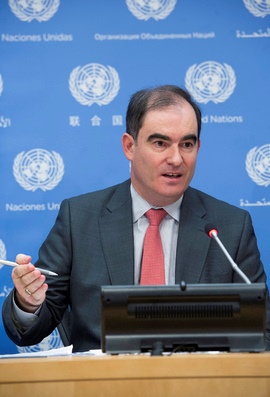Sudan’s foreign minister Ibrahim Ghandour has told a visiting donor delegation that the government is ready to allow international aid groups to access South Kordofan and Blue Nile provided they don’t offer assistance to the rebels.

- John Ging, Director of Operations for the UN Office for the Coordination of Humanitarian Affairs (OCHA), (Photo UN)
Ghandour, who met with the donor delegation headed by the director of operations for the UN Office for the Coordination of Humanitarian Affairs (UNOCHA) John Ging on Sunday, said that Sudan’s relations with the donor countries would not negatively affect the contribution they provide for humanitarian aid in Sudan.
According to the foreign ministry spokesperson, Ali al-Sadiq, Ghandour pointed that Sudan who hosts 500,000 refugees from South Sudan and 60,000 refugees from Syria wouldn’t fail to offer assistance to its own people if the economic sanctions were lifted and the external debts were cancelled.
Ghandour described the sanctions and foreign debts as the two hurdles which prevent Sudan from helping the IDP’s and the refugees.
Al-Sadiq told reporters on Sunday, that the minister accused the rebels of hindering the work of the vaccination teams, pointing to vaccination campaigns carried out by the government in South Kordofan and Blue Nile according to the trilateral protocol signed between the Arab League (AL), United Nations (UN) and the Sudanese government.
The minister reiterated the government refusal for the unmonitored aid delivery across the borders, demanding the delegation to put pressure on the rebel groups in order to achieve political settlement through dialogue and negotiations.
Ghandour further emphasized the government readiness to issues permits for delivering assistance to South Kordofan and the Blue Nile provided that aid groups don’t allow the use of their aircraft to smuggle weapons or rebels as was the case in previous experiences.
Ghandour said the recent dispute between the hybrid peacekeeping mission in Darfur (UNAMID) and the government with regard to the food containers could have been resolved through the tripartite committee, pointing the committee’s work has been stopped following the UN refusal to accept the agreement it reached on the exit strategy.
A tripartite committee including the Sudanese government, African Union (AU) and UN has been set up to develop an exit strategy for the UNAMID from Darfur.
Last June, the Sudanese government said the UN has retracted from an agreement reached by the committee, noting the refusal came as a result of the UN headquarters attempt to impose a specific agreement that has been rejected by the committee.
The spokesperson said the donor delegation stressed their desire for more cooperation with in the humanitarian domain.
The head of the delegation John Ging for his part said the purpose of their visit is to reach an understanding with the Sudanese government on conducting the humanitarian work, pointing to the latter’s cooperation in this regard.
“We aim to succeed through cooperation with the Sudanese government in order to overcome the obstacles and face the challenges,” he added.
He added that they came to Sudan to listen to the government demands and to assess the country’s regional and international role in the humanitarian work domain.
It is worth to mention that the donor delegation’s visit includes meetings with senior government officials in Khartoum, donors, diplomatic missions and humanitarian aid organizations in addition to completing field visits to Darfur and the Blue Nile.
According to UN figures, 5.4 million people are in need of humanitarian assistance in Sudan. Despite the ongoing efforts to bring peace in western Sudan there are over 2.5 million displaced people in Darfur.


